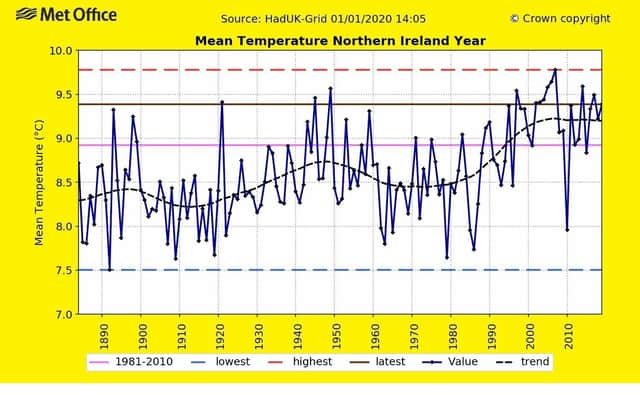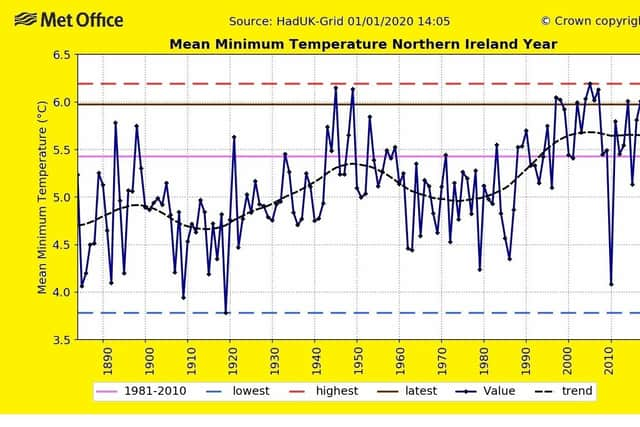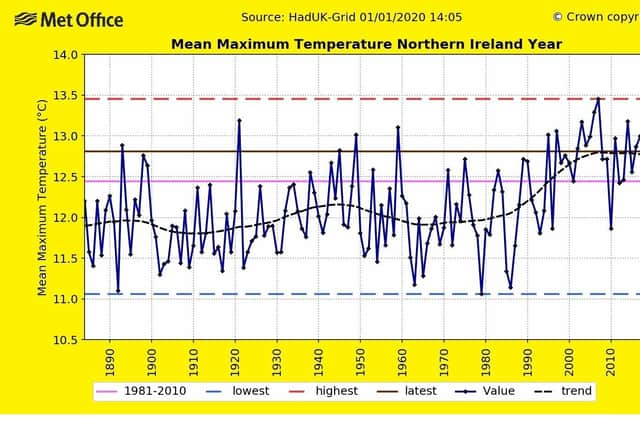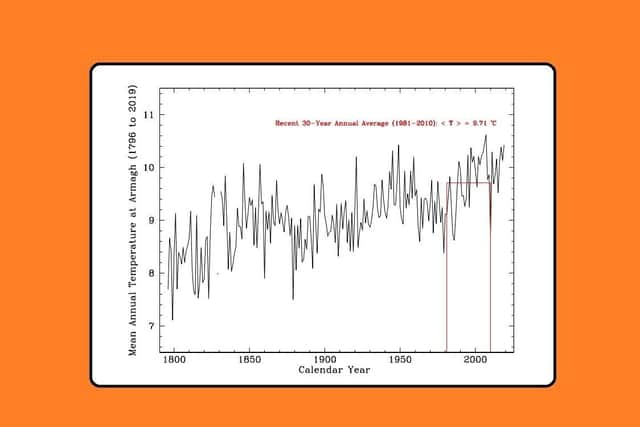NI almost 1C warmer than when records began – and experts predict major changes by 2100


That is the picture painted by observations from both the Met Office and Armagh Observatory, coupled with the predictions of UK scientists.
The graph here illustrates the unmistakable upward trend, based on Met Office data going back to the late 1800s.
Advertisement
Hide AdAdvertisement
Hide AdThe News Letter began looking at the long-term patterns of the Province’s climate following a notably wet and dull August (and summer generally).


There are further charts like the one above in the online version of this story.
But whichever measure is looked at – whether overall temperature, average minimum temperatures, or average maximum ones – the pattern is the same: the Province is warming, and spikes of unusually-warm weather are becoming more frequent.
The Met Office told the News Letter that “by the end of the century it is very likely that most parts of Northern Ireland will experience increases in average summer temperature” – of anything between 0.5C to 6C, depending on how much we mitigate climate change in the mean time (with the most likely range being between 1C and 3.5C).
Advertisement
Hide AdAdvertisement
Hide AdMeanwhile winter temperatures could increase by up to 5C at the far upper end of the predictions (with 1C to 3C being the most likely range).


The Met Office also said that “by the end of the century it is likely that most parts of Northern Ireland will experience reduced rainfall in summer” – possibly by as much as 45% in the most extreme scenario.
Meanwhile winter rainfall is likely to increase – possibly by as much as 35%.
Data from the Armagh Observatory goes back even further (to the late 1700s) and shows even more clearly the pattern of warming since then.
Advertisement
Hide AdAdvertisement
Hide AdThe observatory’s Mark Bailey said: “It seems likely that this general trend will continue, although because Northern Ireland’s climate is very strongly influenced by the North Atlantic Ocean – one of the great oceans of the world – it is unlikely in my view that we will see quite the same temperature extremes that will perhaps become more common in England and continental Europe.”


The London-based Royal Society – the oldest and arguably most prestigious such scientific society in the world – was asked what the likely upshot would be for agriculture.
At a UK-level it predicts “shortages of water affecting availability for people, agriculture, industry, and ecosystems; Further declines of species and habitats; New and emerging pests and diseases, including invasive non-native species; And impacts on domestic and international food production and trade”.
Internationally it says “climate change is expected to reduce fruit and vegetable yields, especially in tropical and subtropical regions” and “while increased carbon dioxide may enhance crop productivity in some regions under lower levels of warming, risks from the greater frequency of extreme events will rise”.
UFU: FARMERS ALREADY FEELING IT
Advertisement
Hide AdAdvertisement
Hide AdThe president of the UFU has said farmers are “up for it” when it comes to trying to curb greenhouse gas emissions.
Victor Chestnutt made the comments in response to questioning from the News Letter about what the future may hold for the Province’s climate.
According to the Royal Society, farming makes up about 9% of the UK’s emissions.
Mr Chestnutt said: “All sectors need to take action to tackle climate change.
Advertisement
Hide AdAdvertisement
Hide Ad“The agricultural sector has an important role to play and can be part of the solution.
“Reducing greenhouse gas emissions is a huge challenge for NI agriculture but we are up for it.
“Farmers are at the forefront of climate change and are already coping with a changing climate and extreme weather events such as floods, drought, severe snowfall and storms, and recognise action must be taken to address the shift in the earth’s climate system.
“The UFU has been part of Northern Ireland’s Greenhouse Gas Emissions Industry Partnership since its inception over 10 years ago and has been working to deliver the targets set out in the strategy.”
READ MORE FROM THIS REPORTER:
Advertisement
Hide AdAdvertisement
Hide AdCLICK HERE: Jay Donnelly controversy: Glentoran ‘sold nine season tickets in an hour and refunded just one‘
——— ———
A message from the Editor:
Advertisement
Hide AdAdvertisement
Hide AdThank you for reading this story on our website. While I have your attention, I also have an important request to make of you.
With the coronavirus lockdown having a major impact on many of our advertisers — and consequently the revenue we receive — we are more reliant than ever on you taking out a digital subscription.
Subscribe to newsletter.co.uk and enjoy unlimited access to the best Northern Ireland and UK news and information online and on our app. With a digital subscription, you can read more than 5 articles, see fewer ads, enjoy faster load times, and get access to exclusive newsletters and content. Visit https://www.newsletter.co.uk/subscriptions now to sign up.
Our journalism costs money and we rely on advertising, print and digital revenues to help to support them. By supporting us, we are able to support you in providing trusted, fact-checked content for this website.
Alistair Bushe
Editor